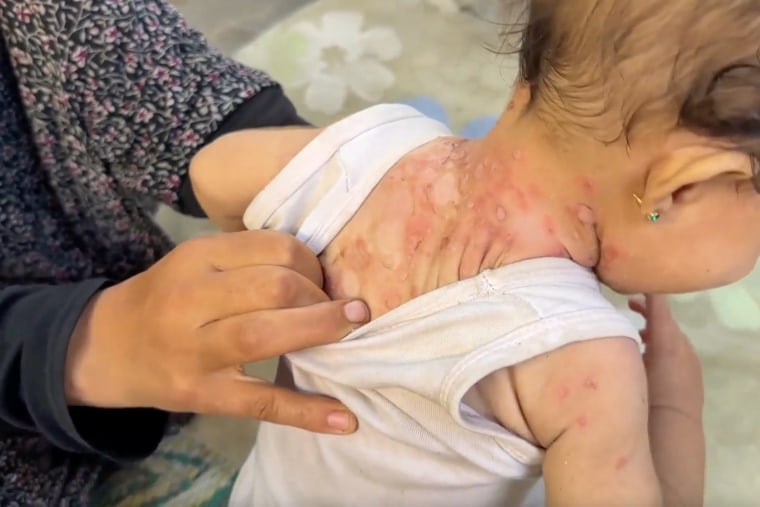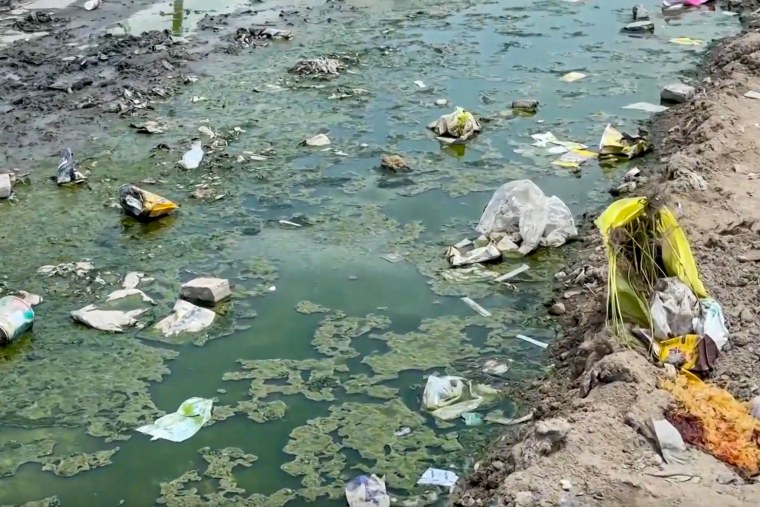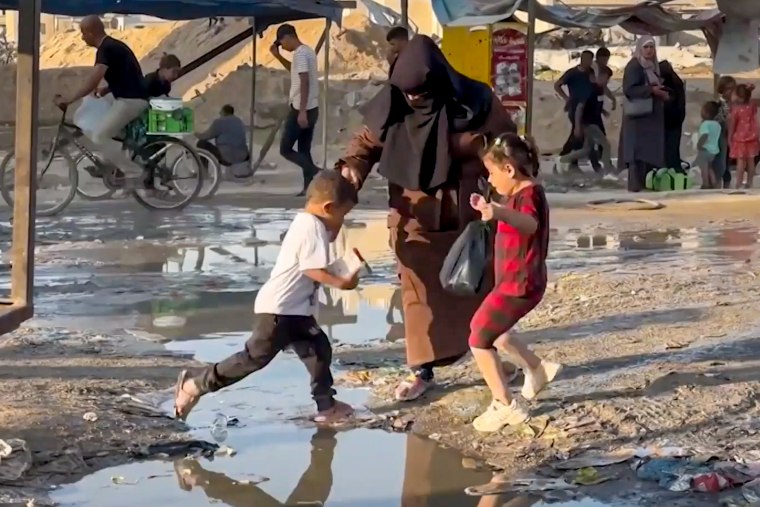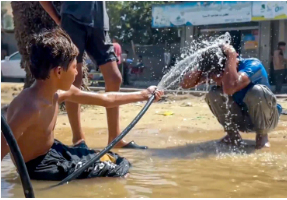There is a severe shortage of clean water in Gaza as a result of extensive damage or destruction to the water infrastructure, which is especially dangerous for small children.

Doctors informed Sobhia’s mother that the blistering rash on her 7-month-old daughter’s skin was caused by germs from contaminated water.
The baby was born a few months after the Israel-Hamas conflict broke out, and families, medical professionals, and relief organizations in the region claim that a large number of small children in Gaza are suffering from illnesses linked to drinking or bathing in tainted water. Skin infections and hepatitis are common problems.
In an interview conducted last month, Sobhia’s mother, Samar Hamoda, stated that the family was residing in an evacuation zone in the southern city of Khan Younis after being forced to leave northern Gaza. (On Friday, the Israeli military issued evacuation orders in eastern Khan Younis.)

Hamoda remarked, “We came here to even worse conditions.” “We couldn’t find a sanitary place to stay or potable water to give our kids a shower.”
She said that while Sobhia had been prescribed medication, the family was unable to locate a facility that would provide it for free, and she was unable to pay the cost.
Wells and desalination facilities are crucial to Gaza’s water system, but a large portion of this infrastructure has been destroyed. Last month, Oxfam International, a humanitarian organization, projected that 88% of Gaza’s water wells and all of its desalination units had been damaged or destroyed.
According to Oxfam, 70% of Gaza’s sewage pumps and all of its wastewater treatment plants have vanished. Consequently, the organization estimates that since the beginning of the conflict, Gaza’s water supply has decreased by 94%, to fewer than 5 liters per person per day. (According to the UN, individuals in an emergency require at least 15 liters per day.)
Regarding diseases brought on by contaminated water in Gaza, a request for response from Israeli officials was not answered. However, the Coordination of Government Activities in the Territories, or COGAT, an Israeli government agency that serves as a liaison between humanitarian organizations and the armed forces, announced last month on X that it had formed a team to deal with the enclave’s sanitation problems, including disposing of waste and obtaining electricity for a desalination plant.
According to COGAT, “the team is also investigating additional measures to improve sanitation in Gaza, including well repairs, desalination plant upgrades, and water line extensions.”
Although they have very little access to the enclave, humanitarian organizations have attempted to assist with infrastructure repairs, septic tank installations, clean water distribution, and chlorine pill distribution. As a result, residents are forced to wash and drink in untreated, sewage-contaminated waters without the use of soap or disinfectants.
According to Steve Morrison, senior vice president of the nonprofit Center for Strategic and International Studies, “you do not have a significant flow of safe and potable water coming in by tanker trucks crossing the border, and you do not have the desalination effort up and running, and you do not have the wastewater treatment functioning to keep fecal contamination down.”
Hepatitis A is a liver illness that can heal on its own when food or water tainted with excrement is consumed; nevertheless, poor diet and hygiene might raise the risk of complications.
According to Dr. Ahmed Al-Farra, head of the pediatric department at Nasser Hospital in Khan Younis, “hepatitis A is widely spread nowadays in the Gaza Strip due to bad sanitation, bad quality of food, and water pollution.” This statement was made in June.
He gave the account of a 4-year-old kid at his hospital who had hepatitis A-related liver failure. According to Al-Farra, the boy’s health necessitated a transplant, which is “not available in Gaza Strip, even before the war.”
According to UN estimates, since the start of the conflict, there have been about 40,000 cases of hepatitis A in Gaza, as opposed to just 85 occurrences between October 2022 and July 2023. Furthermore, there have been over a million additional instances of acute respiratory infections, over 500,000 cases of severe diarrhea, and over 100,000 cases of jaundice. The World Health Organization also noted that from October to the end of June, there were about 103,000 instances of lice and scabies and almost 65,000 cases of skin rashes.

At least thirty water wells in the southern part of Gaza were damaged last month, according to Khan Younis mayor Alaa Al-Bata.
“We fear that many of the other wells, which are located in the evacuation areas, will be destroyed,” he stated. “We have a serious water crisis right now.”
As of last week, Nasrin Al-Qarra, who had been uprooted along with her family and was living in Khan Younis, had reported standing in lengthy queues to get bath water.
“We frequently drink salted water,” she said. We have no idea what the future holds for you. The most crucial thing is that I only drink when I’m thirsty.
According to reports from the UN, work is being done to bring back electricity to a desalination facility in southern Gaza, which might provide clean water to almost a million people.
However, the risks to one’s health posed by contaminated water continue to grow: Six wastewater samples from Gaza were found to have the polio virus in June. This came after the region’s polio vaccination rate declined the previous year. The WHO warns that there is a significant chance of polio spreading in Gaza even if no new cases have been confirmed. One of the many ways the virus can spread is by drinking water tainted with an infected person’s excrement.
In the upcoming weeks, the WHO intends to give out 1.2 million polio vaccinations in Gaza. over the possibility of polio in the enclave, the Israeli military did not reply to a request for comment. However, COGAT stated on Tuesday on X that it is in favor of a polio vaccine program and has communicated with UNICEF and the WHO over the matter. (The Israeli military has further said that it will provide polio vaccines to its soldiers stationed in Gaza.)
Morrison acknowledged that there are significant obstacles facing the vaccine campaign, including the need to store the doses at cool temperatures to prevent spoilage and the uncertainty surrounding the availability of medical professionals to give them.
As far as we are aware, immunizing youngsters several times in their homes is the most effective method. You don’t have folks in their homes here, he said.





